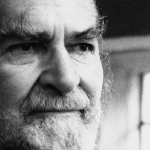I
Brag, sweet tenor bull,
descant on Rawthey’s madrigal,
each pebble its part
for the fells’ late spring.
dance tiptoe, bull,
black against may.
Ridiculous and lovely
chase hurdling shadows
morning into noon.
May on the bull’s hide
and through the dale
furrows fill with may,
paving the slowworm’s way.
A mason times his mallet
to a lark’s twitter,
listening while the marble rests,
lays his rule
at a letter’s edge,
fingertips checking,
till the stone spells a name
naming none,
a man abolished.
Painful lark, labouring to rise!
The solemn mallet says:
In the grave’s slot
he lies. We rot.
Decay thrusts the blade,
wheat stands in excrement
trembling. Rawthey trembles.
Tongue stumbles, ears err
for fear of spring.
Rub the stone with sand,
wet sandstone rending
roughness away. Fingers
ache on the rubbing stone.
The mason says: Rocks
happen by chance.
No one here bolts the door,
love is so sore.
Stone smooth as skin,
cold as the dead they load
on a low lorry by night.
The moon sits on the fell
but it will rain.
Under sacks on the stone
two children lie,
hear the horse stale,
the mason whistle,
harness mutter to shaft,
felloe to axle squeak,
rut thud the rim,
crushed grit.
Stocking to stocking, jersey to jersey,
head to a hard arm,
they kiss under the rain,
bruised by their marble bed.
In Garsdale, dawn;
at Hawes, tea from the can.
Rain stops, sacks
steam in the sun, they sit up.
Copper-wire moustache,
sea-reflecting eyes
and Baltic plainsong speech
declare: By such rocks
men killed Bloodaxe.
Fierce blood throbs in his tongue,
lean words.
Skulls cropped for steel caps
huddle round Stainmore.
Their becks ring on limestone,
whisper to peat.
The clogged cart pushes the horse downhill.
In such soft air
they trudge and sing,
laying the tune frankly on the air.
All sounds fall still,
feilside bleat,
hide-and-seek peewit.
Her pulse their pace,
palm countering palm,
till a trench is filled,
stone white as cheese
jeers at the dale.
Knotty wood, hard to rive,
smoulders to ash;
smell of October apples.
The road again,
at a trot.
Wetter, warmed, they watch
the mason meditate
on name and date.
Rain rinses the road,
the bull streams and laments.
Sour rye porridge from the hob
with cream and black tea,
meat, crust and crumb.
Her parents in bed
the children dry their clothes.
He has untied the tape
of her striped flannel drawers
before the range. Naked
on the pricked rag mat
his fingers comb
thatch of his manhood’s home.
Gentle generous voices weave
over bare night
words to confirm and delight
till bird dawn.
Rainwater from the butt
she fetches and flannel
to wash him inch by inch,
kissing the pebbles.
Shining slowworm part of the marvel.
The mason stirs:
Words!
Pens are too light.
Take a chisel to write.
Every birth a crime,
every sentence life.
Wiped of mould and mites
would the ball run true?
No hope of going back.
Hounds falter and stray,
shame deflects the pen.
Love murdered neither bleeds nor stifles
but jogs the draftsman’s elbow.
What can he, changed, tell
her, changed, perhaps dead?
Delight dwindles. Blame
stays the same.
Brief words are hard to find,
shapes to carve and discard:
Bloodaxe, king of York,
king of Dublin, king of Orkney.
Take no notice of tears;
letter the stone to stand
over love laid aside lest
insufferable happiness impede
flight to Stainmore,
to trace
lark, mallet,
becks, flocks
and axe knocks.
Dung will not soil the slowworm’s
mosaic. Breathless lark
drops to nest in sodden trash;
Rawthey truculent, dingy.
Drudge at the mallet, the may is down,
fog on fells. Guilty of spring
and spring’s ending
amputated years ache after
the bull is beef, love a convenience.
It is easier to die than to remember.
Name and date
split in soft slate
a few months obliterate.







Comment form: